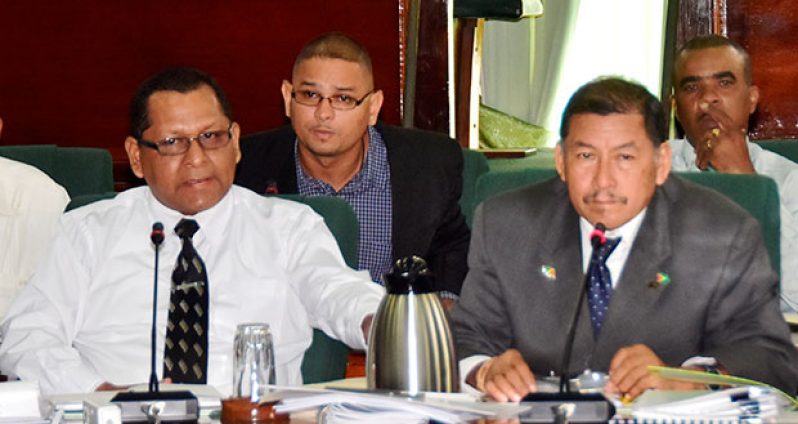By Ariana Gordon
AMENDMENTS to the Amerindian Act could give indigenous peoples veto powers over large-scale mining projects, attorney David James said Wednesday. “There have been concerted requests that certain provisions related to mining, such as, Section 50, which deals with large-scale mining should…be reviewed and revised to ensure that the full consent of indigenous peoples is obtained before large-scale mining can proceed,” James told the Parliamentary Natural Resources Committee.
James is attached to the Ministry of Indigenous People’s Affairs. Minister Sydney Allicock and James faced tough questions from the committee over the need to amend the 2006 Amerindian Act.
James said that the communities of Kamarang and Jawalla are calling for the law to provide for “full consent” by Amerindian villages, which is the case for small and medium-scale mining. He noted that Section 50 of the Legislation provides for the Minister of Indigenous People’s Affairs or the Minister of Mining to consent to large-scale mining in an indigenous community if that community withholds its consent.

The indigenous community if not satisfied with the decisions made, can take the matter to the courts.
James and Minister Allicock told the Committee that the National Toshaos Council (NTC) along with other groups and stakeholders have called for the Amerindian Act to be reviewed and as such, it is the responsibility of the Ministry of Indigenous People’s Affairs to have consultations in that regard.
“What are the specific clauses or issues that the clamour for review is going to engage?” asked Pauline Sukhai, former Minister of Amerindian Affairs.
“Based on my interaction, the villages have not submitted anything in writing to the minister as yet… I visited all in the last year,” she said.
“Is this review being fuelled by a Non-Governmental Organisation (NGO), is it being fuelled by the NTC, the legal and legitimate representative of the indigenous people who were elected? Or is it being fuelled by an election campaign to satisfy friends who have grouses [sic] since the inception of the new Act in 2006… who or which body of indigenous representative or people have actually led this matter to be on the review desk of the minister?
The attorney sought to give an answer.
“There has been a call by indigenous villages across the country in our outreaches over the past year. In almost every village that we have visited there have been calls for revision, if not to the entire Act, to certain aspects,” James said.
Both Minister Allicock and attorney James said that concerns have been raised on the issue of consent being granted to large-scale miners within Amerindian communities.
As a result of that, Chairman of the Committee, Odinga Lumumba, questioned the need to change the legislation on that ground, since there are no large-scale, gold-mining operations being conducted on lands belonging to indigenous peoples.
James said the law currently allows for the communities to have a say in the granting of small and medium-scale mining licences, but not for large-scale mining.
But he said the issue of consent relative to large-scale mining was not the only issue up for discussion.
“We have engaged the NTC in consultation and we also engaged a consultant and legal expert who has provided some advice on how we can proceed with some of the amendments we are proposing,” James added.
Lumumba questioned whether the position spoken of by James is one that represents the views of the Indigenous People’s Affairs Ministry or that of the Toshaos in the various indigenous villages. Minister Allicock, in response, said the matter is being discussed at every level and it follows from “a request made by the villages.” He said eventually the best way forward will be decided upon.
Allicock said his ministry is working closely with the NTC and he expects that at their upcoming conference, there will be continued deliberations on the matter. He explained that the issue was raised last year at the NTC and a commitment was given to have it deliberated upon further this year.
Sukhai maintained that consultations have not begun on the issue based on her groundwork and suggested that “the Amerindian People’s Association (APA) seem to be taking the lead and not the NTC.”
Sukhai and the APA had a testy relationship when she was minister.
“I don’t believe that there is tremendous large- scale mining in any Amerindian community with the exception of other types of mining,” she continued. The minister was then asked to state one large-scale mining company that is currently mining on Amerindian lands and which breaches the Act.The answer he could not provide.
“I would prefer to give a breakdown and give you a better report,” replied the hesitant minister, who referred Sukhai to James.
“With respect to the first question, on whether there is any Amerindian village that is affected by large- scale mining, or is being in any way violated as a result of large-scale mining, the answer is none,” responded the attorney.
Notwithstanding the back and forth, the chairman of the committee called for “serious consultations.”
The minister was then asked whether he, as an indigenous person, has any grave concerns about the Amerindian Act. He said that he was not comfortable where the Act speaks to “the Guyana Geology and Mines Commission (GGMC) satisfying itself with land that might be up for mining.”
It was then that the chairman questioned whether the minister felt that GGMC has too much authority in this area.
“I am not saying that….I have heard that and seen that and that is the area of concern. We need to address that together. [We have to] take into consideration, the environment, the livelihoods of the people who live there and the benefits- that is one critical area,” said Minister Allicock.












